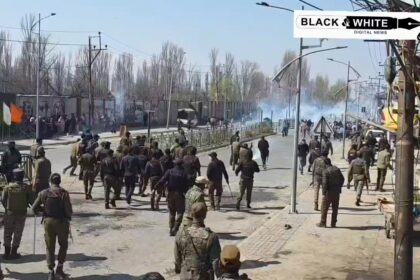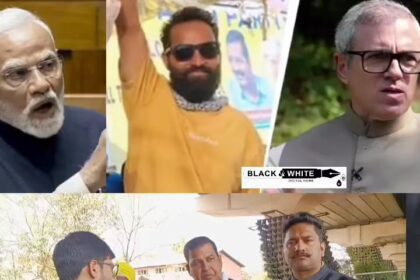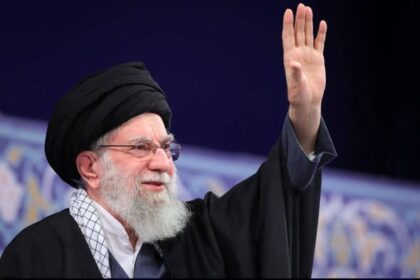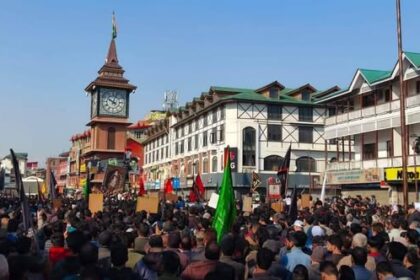Rohingya Crisis Should Not Be an Excuse to Victimize Indian Muslims: Tariq Hameed Karra
BJP’s Policies Creating Fear and Distrust Among Minorities in India, Says JKPCC Chief
||Black and White Digital News ||
||December 10,2024 ||
KASHMIR : The Rohingya crisis has been a matter of global and regional concern. Fleeing persecution in Myanmar, thousands of Rohingya refugees have sought asylum in neighboring countries, including India. However, their presence in India has sparked political and communal debates. The BJP-led government has often emphasized the need to identify and deport “illegal immigrants,” citing national security concerns. This approach has drawn criticism from opposition leaders and human rights organizations, who argue that it fosters discrimination and communal polarization.
Tariq Hameed Karra’s Statement:
Tariq Hameed Karra, the Jammu and Kashmir Pradesh Congress Committee (JKPCC) Chief, has expressed serious concerns over the ongoing identification process of Rohingya refugees in India. He warned that this process could be misused to target Indian Muslims, thereby exacerbating existing communal tensions. Karra accused the Bharatiya Janata Party (BJP) of creating an environment of fear and distrust among the country’s minority communities through divisive policies.
Karra stated,“The plight of the Rohingyas is a humanitarian crisis, but instead of addressing it with sensitivity, the BJP is using it as an excuse to further its divisive agenda. Indian Muslims are being unfairly victimized under the pretext of identifying illegal immigrants.”
The Broader Political Implications:
BJP’s Stance on National Security: The BJP has consistently maintained that the presence of undocumented immigrants, including Rohingyas, poses a security threat. The party argues that such individuals could potentially be exploited by extremist groups. Measures like the Citizenship Amendment Act (CAA) and the proposed National Register of Citizens (NRC) have been justified as tools to safeguard India’s sovereignty. However, critics argue that these policies disproportionately impact Muslims, creating a sense of alienation and vulnerability among them.
Fear Among Minorities :
Karra’s comments highlight growing apprehensions within India’s Muslim community regarding the government’s policies. While the Rohingya issue pertains to refugees, there is a perception that such initiatives are being extended to question the citizenship and loyalty of Indian Muslims. This has intensified fears of marginalization among the minority community.
Humanitarian Concerns Over the Rohingyas:
The Rohingya refugees are one of the most persecuted groups in the world. In India, they face harsh living conditions, lack of basic amenities, and legal limbo. Advocacy groups argue that India, as a signatory to various international conventions on refugees, has a moral and legal obligation to provide protection and assistance. However, the government’s focus on deportation has overshadowed these humanitarian concerns.
Criticism of the BJP’s Approach:
Opposition leaders, including Karra, accuse the BJP of using the refugee issue to deflect attention from pressing economic and social issues. They argue that the party’s focus on divisive issues like the Rohingyas is part of a broader strategy to consolidate its political base by appealing to nationalist and majoritarian sentiments.
The Way Forward: Karra’s call for addressing the Rohingya issue with a humanitarian approach rather than politicizing it underscores the need for balanced policymaking. He urged the government to work with international agencies to ensure the refugees’ safety and dignity while safeguarding national security without targeting specific communities.
The Rohingya crisis, while primarily a refugee issue, has become a flashpoint for communal and political debates in India. Tariq Hameed Karra’s concerns reflect the fears of Indian Muslims about being unfairly targeted in the current political climate. The government faces the dual challenge of addressing security concerns while upholding the rights and dignity of refugees and its citizens. The need for inclusive policies and constructive dialogue has never been more critical.
Tariq Hameed Karra
Leave a comment
You Might Also Like
Police use tear gas shells to disperse people protesting the killing of Iran’s supreme leader, Ayatollah Ali Khamenei, in Srinagar.
Police use tear gas shells to disperse people protesting the killing of Iran’s supreme leader, Ayatollah Ali Khamenei, in Srinagar.…
0 Min Read
Mehraj Malik Aam Logon Ki Bat Karta Tha Isliye Uspar PSA Laga Diya CM Omar Abdullah Sahab Nhi Chahte Wo Bahar Aaye Amit Kapoor
Mehraj Malik Aam Logon Ki Bat Karta Tha Isliye Uspar PSA Laga Diya CM Omar Abdullah Sahab Nhi Chahte Wo…
0 Min Read
Ayatullah Khameni Shaheed Huve Hai Na Jhuke Hai Na Jhikege Protest In Bathandi Jammu
Ayatullah Khameni Shaheed Huve Hai Na Jhuke Hai Na Jhikege Protest In Bathandi Jammu
0 Min Read
Iran’s Supreme Leader Ayatollah Ali Khamenei, Who Led The Islamic Republic Since 1989, Is Dead At 86 Protests In Kashmir Against Killing Of Iranian Leader Khamenei
Iran’s Supreme Leader Ayatollah Ali Khamenei, Who Led The Islamic Republic Since 1989, Is Dead At 86 Protests In Kashmir…
0 Min Read









